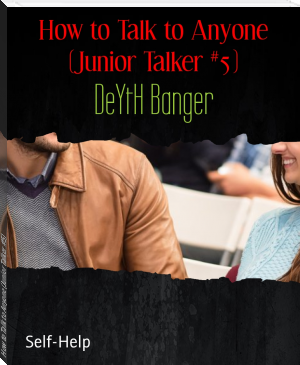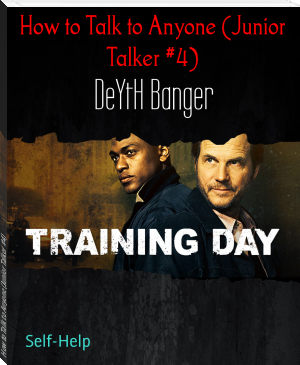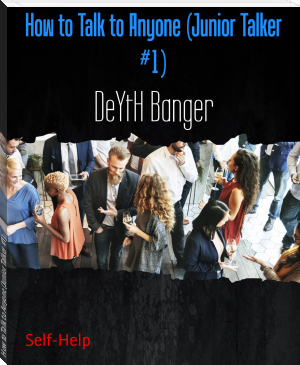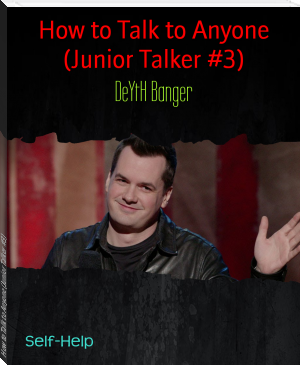How to Talk to Anyone (Junior Talker #5) by DeYtH Banger (old books to read .TXT) 📕

- Author: DeYtH Banger
Book online «How to Talk to Anyone (Junior Talker #5) by DeYtH Banger (old books to read .TXT) 📕». Author DeYtH Banger
In the realm of neurology, they find that patients with dementia or Alzheimer’s as having low or impaired verbal fluency.
We’re getting way too technical already, and here at The Art of Verbal War, we are all about making things simpler and less complicated, so let’s do that.
Verbal fluency, simply put, is the ability to find the right words at the right time or in the right situation. And, it’s a great thing to have in abundance.
The more horsepower a car has, the faster it can go 0 to 60. So, just like a car, the more verbally fluent you are, the faster your brain can find the right words to speak.
A few examples of the types of situations you need high verbal fluency in would be answering job interview questions, flirting smoothly with a girl, sitting up on stage in a press conference and answering questions from the press, or standing in front of a jury and cross-examining a hostile witness.
A person in any of these situations, and many other situations, will need to call on his/her verbal fluency in order to succeed in them. If your verbal fluency is not up to par, you will not kick ass in these situations.
Even More On Verbal Fluency
Verbal fluency is a collection of various cognitive processes, and not just one discrete process.
Various studies have shown verbal fluency to be connected to working memory, switching ability, response suppression, and fluid intelligence, among other cognitive processes. It makes intuitive sense that many different cognitive processes are involved in helping you be verbally fluent.
Again, let’s look at this at a more layperson level:
When you have a high level of verbal fluency, you will have an easier time translating your thoughts into spoken words. So, if you want to become more eloquent and verbally skilled, among other things, it is vitally important that you learn how to maximize your verbal fluency.
A Framework For Increasing Verbal Fluency
Now, let’s get this out of the way. I am not a medical professional or scientist, so everything you will learn in this article should be read with that in mind. Please seek professional advice as you deem necessary.
Having said that, now let me share with you the framework/thinking behind the tips I am about to share with you which have worked for me to develop and enhance my own verbal fluency. Here’s the framework:
From a neurological standpoint, you are looking for ways to decrease your cognitive load and to increase your working memory. Anything that helps support these two goals should, in theory, enhance your verbal fluency.
Cognitive load refers to the total amount of mental effort being used in the working memory.
In other words, “cognitive load” is the total amount of mental activity imposed on working memory in any one instant.
And, “working memory” is the part of short-term memory that is concerned with immediate conscious perceptual and linguistic processing.
In other words, the ability to remember and use relevant information while in the middle of an activity…like speaking.
Distractions, age, level of knowledge about a subject, difficulty/complexity of a subject, the way information is conveyed, the sheer amount of information being conveyed, and other things (many of which we don’t even know yet) affect the amount of cognitive load that is put on the working memory. For example, an audio-visual presentation format imposes a lower cognitive load than a visual plus text format, because in the former case, working memory has less information to process.
Now that you understand the framework and the goals we are trying to achieve, let’s move on to my ideas that you can try to enhance your own verbal fluency.
Ideas To Increase Verbal Fluency
When I was in my third year of law school, I took a trial advocacy class. I was extremely excited to conduct my first mock trial ever. Visions of becoming the next Johnny Cochran filled my mind.
I didn’t prepare as well as I should have so when I was in the middle of that first trial, I encountered some difficulties with the cross-examination and I panicked. I stumbled my way to the end of the trial and the verdict was delivered. I had lost my first “trial”.
That day, I learned that that in the heat of the moment, the right words eluded me in a way that they didn’t when I was merely practicing.
This revelation led me to consciously work on this weakness of mine, and after many years of trying to improve on this weakness, here are some ideas for you to try if you want to increase your verbal fluency:
1. Control Your Emotions
As I found out in my mock trial back in law school, I let my emotions get the better of me. What I have found out is that when I get emotional, my verbal fluency decreases.
Remember back to last time you were verbally insulted. It probably made you extremely upset, and then you couldn’t come up with a comeback at all, right? Let me tell you why. It was because your emotions completely took over, and as a result, your verbal fluency went to zero.
After you’ve calmed down, but way after the person who insulted you was no longer there, you had no problem coming up with a zippy comeback.
Does that sound vaguely familiar?
This makes sense because emotions cause an increase in cognitive load on your brain, and so there is less horsepower available to use for verbal tasks.
In fact, a 2014 study by Buchanan showed that high stress can negatively impact word retrieval, leading to less fluent speech.
Another 2005 study by Gardner showed that “communication apprehension” (also known as communication anxiety) also has an impact on verbal fluency.
So, anything that you can do to train yourself to stay calm and detached, such as meditation or heart rate variability training, will help with verbal fluency. Of course, these two methods are a longer-term plan for helping your verbal fluency.
Heartmath emWave2 – Heart Rate Variability Trainer
In a specific, short-term situation, anything you can do to limit negative emotions and putting yourself into a relaxed state will help with verbal fluency in that particular situation. Removing, eliminating, reducing, or managing acute stressors in these situations will also help with your verbal fluency in the moment.
2. Eliminate Multi-tasking
Even though a lot of people love to multi-task, researchers have found that multi-tasking behaviors increase cognitive load and can affect your verbal fluency.
Again, this makes a lot of sense intuitively. It’s much more complex to perform more than one task at a time, so the cognitive load is greater on your brain.
3. Check For Underlying Conditions
A number of medical or psychological conditions may adversely affect your cognitive functioning (and therefore your verbal fluency), such as depression, low testosterone, ADD/ADHD, among others. If you think you suffer from any of these conditions, I strongly encourage you to get them checked and managed, and you may find your verbal fluency improving along with the underlying condition.
It may also be possible for you to work with a psychologist to get your verbal fluency tested directly if you think you are suffering from abnormal levels of verbal fluency.
4. “Know Your Shit”
This may seem quite obvious. I alluded to it earlier.
When talking about a specific subject, you have to “know your shit”. The less knowledge you have about a subject, the more cognitive load there is on your brain when you’re talking about that subject.
Let’s say you are going to give a talk about turtles. If you don’t know much about turtles, how verbally fluent can you hope to be in your talk? Probably not very much!
The more you know about a topic, the more verbally fluent you will be when talking about that topic. Simple, but of course, not easy.
5. Beat Gestures
A 2007 study by Hostetter and Alibali found that the use of “beat gestures” is correlated with higher verbal fluency.
“Beat gestures” are small, rhythmic movements that emphasize certain words or phrases without conveying specific information about the meaning of those words or phrases.
A 1996 study by Rauscher, Krauss, and Chen showed that hand gestures “facilitate access to the mental lexicon”. These two studies were not the only studies in the literature that showed the same thing.
In other words, using hand gestures (especially rhythmic ones, i.e. beat gestures) when you speak should increase your verbal fluency.
6. Working Memory Enhancement
If verbal fluency is the “engine” behind verbal skills, then working memory is like the spark plugs. Of course, verbal fluency is the collection of all the engine elements, but without the spark plugs, the entire engine is useless and will not run.
As such, it stands to reason that if we improve our working memory, then verbal fluency should increase. The main way to train working memory is using brain training/brain games. I use them daily in order to maintain and hopefully enhance my working memory.
by Min Liu
How To Deal With Putdowns – Verbal Self Defense
Using the owner of the San Francisco 49ers as an extremely poor example, you will learn how to deftly and skillfully deal with putdownsand putdown questions in this article and video, which is a key part of learning verbal self defense.
Two weeks ago, the owner of the San Francisco 49ers, Jed York, dismissed the head coach and general manager of the team. He announced this news at a press conference, where the press, sensing his lack of confidence and competence, subsequently ripped him to shreds like a bunch of savages.
What are “Putdown Questions”?
Look at these brutal questions he was asked (and note that they just call him “Jed” and not “Mr. York”):
Reporter: “Jed, why are you competent to lead a search for a general manager and a head coach?
Reporter: “Jed why shouldn’t YOU be dismissed or reassigned?”
How he answered wasn’t important, because frankly, it was painful to watch, but let’s just say the 49er faithful were not reassured.
These questions are what I call “putdown questions”. They’re not just idle questions, they’re questions meant to question your competence, your abilities, your skills, and to put you on the defensive.
Putdown questions are meant to make you justify yourself to the other person, and they are very difficult questions to answer.
Why Should You Learn How To Deal With Putdown Questions?
However, these are questions you cannot avoid in life.
You will encounter putdowns in job interviews.
In business, you will always get putdown questions.
Even with your friends and family, you will also get putdowns and putdown questions. They are a fact of life, and they happen more often than we would like.
So, if you want to thrive in life, especially in high-stakes situations, you must learn how to handle putdowns and putdown questions skillfully. Learning how to deal with putdown and putdown questions are a key component of verbal self defense.
Two Ways To Crush Putdowns and Putdown Questions: Verbal Self Defense
Here are two ways to crush these types of insidious questions, taken from my book ” The New Art of Being Right: 38 Ways To Win An Argument In Today’s World “.
#1: Setting The Table
The first technique is called “setting the table”, which is reshaping the frame of the question from one that disfavors you to one that favors you.
In particular, for the question “Jed, why are you competent to lead a search for a general manager and a head coach?”, the best way to handle it is to reframe or change the frame of the question from an OBJECTIVE frame to a SUBJECTIVE frame. Reframing is a key tactic in verbal self defense.
What I mean by this is that instead of answering the question by giving a laundry list of reasons why you are competent and letting the press answer (which is an extremely stupid way to answer this type of question), you will answer it by defining “competence” from your OWN perspective.
So, this is how I would answer this putdown question:
“TO ME, competence is about knowing when to cut your losses and learning from your mistakes, and that is what I’m doing.”
Once you have defined competence according to YOUR own definition, then your answer becomes bulletproof and it becomes much harder for someone to argue against. That makes for outstanding verbal self defense!
#2: Find One Instance To The Contrary
The second technique is called “find one instance to the contrary”, which means finding





Comments (0)